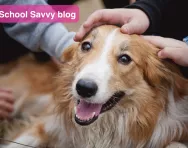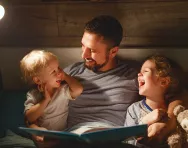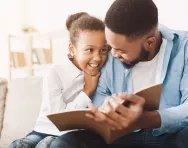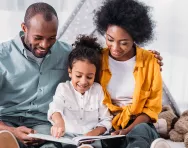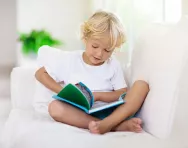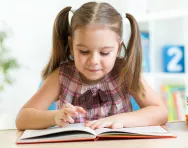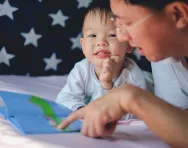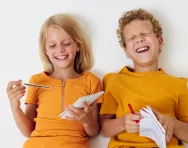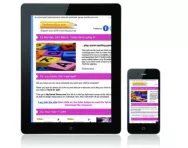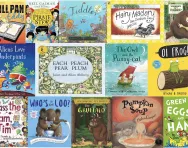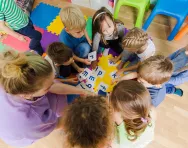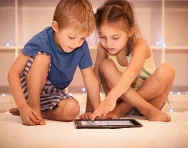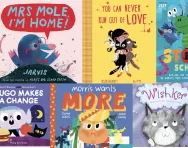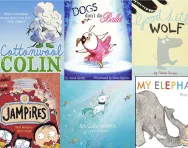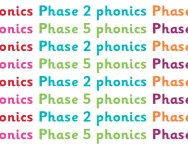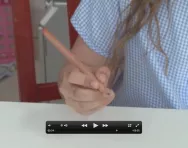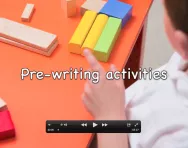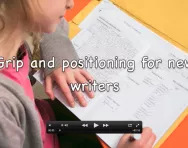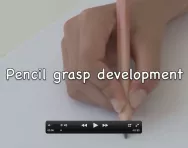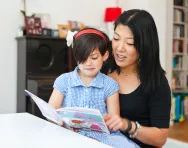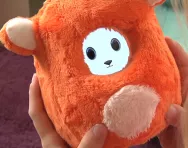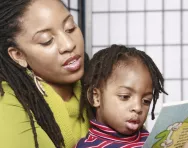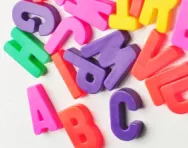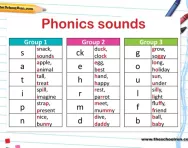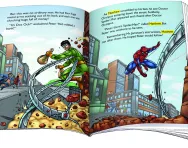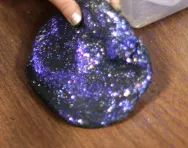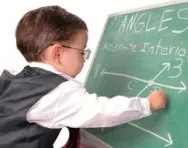Pawsitive changes: Animals transforming schools
Primary school headteacher, Matt Revill, explores the transformative impact of animals in educational settings, addressing key questions such as how dogs assist children in reading, the inspirational value of farm visits and the benefits children derive from therapy pets.
Story time with Dad: best books for bonding & development
In today’s fast-paced world, finding quality time to connect with our children can be a challenge. One of the most enriching ways for father-figures to bond with their kids while fostering their development is through shared reading, so here are our top picks for reading with Dad!
Parents' guide to Phase 6 phonics
Different primary schools use different ways to teach children about sounds and letters, called phonics. But most kids in early years and Key Stage 1 follow a set of steps, or phases, to learn phonics. In Phase 6, they deepen their phonics knowledge and use their skills to help them read and spell. Here, we'll explain what Phase 6 is all about and how you can help your child with it at home.
Parents' guide to Phase 4 phonics
Phonics is a teaching method used across many UK primary schools. Phonics programmes are often broken down into phases, and this can get a little confusing for parents. We explain what Phase 4 phonics involves and how you can help at home.
Parents' guide to Phase 3 phonics
Phonics is a common method used in primary schools to teach children how to read. It involves linking sounds to the letters or groups of letters that represent them. There are different phonics phases that gradually build a child’s knowledge and recognition of sounds so that they can read and write. Here, we explain what Phase 3 phonics are and how they are taught.
Parents' guide to Phase 2 phonics
Phonics is likely to play a significant role in your child's primary school journey. It helps many children develop the ability to read and spell accurately, often achieved by the end of their second year. Here, we explain what is covered in Phase 2 phonics.
Parents' guide to Phase 1 phonics
Phonics is a teaching method used across many UK primary schools. Phonics programmes are often broken down into phases, and this can get a little confusing for parents. We explain what Phase 1 phonics involves and how you can help at home.
5 tips on inspiring your funny child to write jokes
Comedy is often an underrated learning tool. It can encourage your child to be creative, express their individuality and help them engage in reading, writing and performance. Encourage your child’s inner comedian with these tips from stand-up comedian, children’s author and comedy writer Steven Vinacour.
24 fun toys for summer outdoor learning
It's well established that outdoor play is important for young learners and provides opportunities to develop physical, social, fine and gross motor skills. Our editor, Kate Morgan, has put together her top picks of outdoor toys. So get the kids outside, having fun and learning this summer. Let the games begin!
How the daily learning programme works
Whether you're taking your child out of school for a period, setting out on your home education journey or simply looking for extra activities to boost your child's learning, here's why the daily learning programme could be the right fit for you...
Best rhyming books for children
Listening to repeated sounds, rhythms and rhymes offers children clear educational benefits and helps to make them into readers. Best of all, rhyming books are a pleasure to read out loud! Our pick of the best rhyming stories offers a brilliant selection of family favourites that you'll be reciting for years.
What your child learns in Nursery: English and literacy
From learning new vocabulary to mastering the correct pencil grip, here are the literacy skills your child will start to develop in Nursery.
Best nursery rhymes and fairy tales apps for kids
For many children, nursery rhymes and fairy tales are the first step on the road to independent reading. We’ve rounded up 10 of our favourite traditional song and story apps for pre-school, Reception and beyond.
Best books to read with five year olds
Reading time is time to laugh, share and explore stories with your child. Choose books that have a strong rhythm to them and are full of humour, rhyme and attractive illustrations. We've picked ten of our favourites to read with five year olds.
Best picture books for five year olds
Picture books are a fantastic way to develop children’s speaking and listening skills. They also provide a brilliant starting point for children to hypothesise and draw inferences about characters’ thoughts, feelings and actions. Allow time for your child to pore over the illustrations in these beautiful books, make predictions and discuss the story with you.
Phonics phases explained
How does your child master phonics, from learning letter sounds to reading fluently? We explain the phases they may follow in the primary-school classroom.
Video: Tripod grasp quick trick
Make sure your child holds their pencil correctly every time they pick it up with this quick trick, as outlined in our video by National Handwriting Association Occupational Paediatric Therapist Catherine Elsey.
Video: Pre-writing activities to support handwriting
Support your child's pre-handwriting development in nursery and Reception with fun activities and play, all designed to help build essential motor skills and hand muscles. Our video features experts from the National Handwriting Association, sharing practical ideas you can try at home.
Video: correct handwriting grip and positioning for new writers
Help your child establish great handwriting habits from Reception and KS1 with our expert advice video for the parents of new writers. From the correct pencil grip to paper positioning and posture, the National Handwriting Association's Catherine Elsey explains what to look out for and how to make immediate improvements to help your child.
Video: Pencil grasp development
From eighteen months to five years, TheSchoolRun's handwriting video explains how children's pencil grasp changes over time, how to establish good handwriting habits early on and what to expect in every stage.
Best reading scheme books for early readers
Does your heart sink at the thought of another reading practice session after school? Don't lose heart, says primary school teacher, mum and Reading Chest founder Liz Walker. Today's reading scheme books offer exciting stories, non-fiction facts and loads more. Here's how to make the most of early readers, whether your child has just started to blend sounds or is ready to graduate to 'real' books.
100 of the best educational toys: EYFS
Learning toys that are packed with play value, too, our 100 best educational toy picks will help your child identify numbers and letters, learn their high frequency words, understand rhyming and even get to grips with primary-school programming and physics. Get great gift ideas with our recommendations for nursery and Reception children!
What is blending?
As they learn to read, children are taught individual sounds and then how to link them together to form words. By the end of Reception your child will be able to blend sounds together; find out how your child will be taught blending in school and how you can support learning at home.
What is a letter sound?
By the end of EYFS your child should know the sound each letter makes. Find out how your child will be taught letter sounds in school and how you can support learning at home.
What is phonics?
Sort your phonemes from your graphemes, decoding from encoding and digraphs from trigraphs with our parents' guide to phonics teaching. Our step-by-step explanation takes you through the different stages of phonics learning, what your child will be expected to learn and the vocabulary you need to know.
Best personalised books for children
Give your child a really unique introduction to the world of fiction with a personalised book – after all, who wouldn’t want to be the hero or heroine of a fantastic adventure? Seeing their name – and face – in print, alongside favourite characters, will be a thrill whether they’re just starting to read for themselves or ready to embark on classic literature. We pick the best personalised books where your child has the starring role.
4 ideas for homemade playdough
Help your child develop the motor skills needed for handwriting with these no-skills-needed ideas and recipes for playdough and similar slimy substances – ideal for sensory play and scientific investigations!
Should children be able to read and write before they start school?
Emily Organ asks if parents should be educating their children at home before their school days have even begun.
How to tell your child a story – without a book
Once upon a time, before the onslaught of video games, DVDs and the internet, telling stories was one of the only forms of entertainment. Jasmin Qureshi looks at how it can still be beneficial (and great fun!) today.
